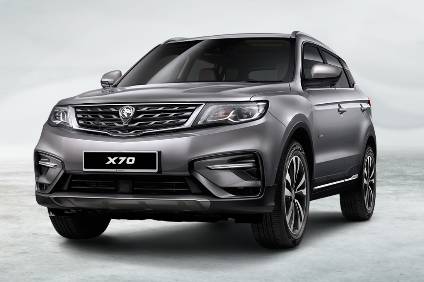
Malaysia’s Proton Holdings announced at the weekend it has already pre-sold over 5,000 units of its new X70, just a week after it opened the order book for the model.
The 1.8L X70 is based on its Chinese partner Zhejiang Geely Holding Group’s Boyue SUV model and is expected to be officially launched sometime in October. It is also the first Geely-based model to be produced by Proton – and unlikely to be the last.

Discover B2B Marketing That Performs
Combine business intelligence and editorial excellence to reach engaged professionals across 36 leading media platforms.
The new Proton SUV will initially be imported from China, with local assembly expected to start at the company’sTanjung Malim plant next year.
The Malaysian first national car company hopes that new Geely-based models, as well as a revamped dealer network, will help reverse the almost terminal decline it has suffered over the last decade or so.
Proton’s decline in its home market has accelerated in the last six years as its ageing product range struggled to compete with rising competition after the previous government, under the now disgraced Prime Minister Najib Razak, reduced some of the market protectionism that had kept foreign brands at arms length for so long.
Proton’s biggest threat has come from closer to home, however, in the form Malaysia’s second national carmaker Perodua – which has Toyota’s small car subsidiary Daihatsu as its strategic and technical partner.
Perodua managed to corner over 35% of Malaysia’s total vehicle market last year with close to 205,000 sales. Proton managed around 71,000 sales, a little over 12% of the total market – just slightly ahead of Toyota but way behind Honda.
Just ten years ago, it was Proton that controlled more than one-third of the local market and if we look further back to the early 1990s, its market share was as high as 70-80%. Admittedly, that was a different world to the one we live in now.
Proton has also struggled to maintain much of a presence in overseas markets where technical standards, including emissions regulations, have moved on significantly in the last decade. As a result, its exports have dwindled to a trickle in recent years, forcing the automaker to look for opportunities in developing markets in Asia and the Middle-East.
The rate of decline in Proton’s overall output in the last six years is staggering. From 161,400 units in 2013, vehicle production collapsed to 67,200 units last year – and that includes some 6,600 Suzuki models assembled under contract. In the real world, these are hardly operating levels that could support anything other than a CKD assembly operation.
Even with huge government support for its R&D programme, Proton has struggled to bring new products to market – including the Campro engine range with its massive cost and development-time overruns. The global automotive industry is clearly moving too fast in technological terms for a stand-alone company the size of Proton, even one with a still hugely protected domestic market.
Proton’s financial losses have ballooned in recent years, making last year’s takeover of a 49.9% stake by Geely look more like a charitable rescue – not only for the DRB-Hicom but also for the Malaysian government.
It is no wonder that other global automakers walked away from the deal the minute they realised they would not be given a majority stake and would not be in ultimate control of strategic decision making.
The injection of new Geely products into Proton will no doubt lift Proton’s fortunes in the coming years, but let’s face it, its performance could hardly be worse than it has been. But questions are now being asked about Proton’s status as a national car company, with its Chinese partner expected to provide pretty much all of the key technology content of future models.
After his re-election to power in May, Dr Mahathir Mohamad is asking this very question – whether Proton and Perodua should still be considered national carmakers, and continue to enjoy the tax privileges that come with this, given their rising dependence on the technology of their foreign strategic partners.
Dr Mahathir, who was behind the establishment of Malaysia’s national car companies during his previous 22-year term as prime minister, believes that the development of the country’s manufacturing and engineering capabilities is key to Malaysia’s future economic success. But suggesting setting up a new national car company is perhaps a step too far.






